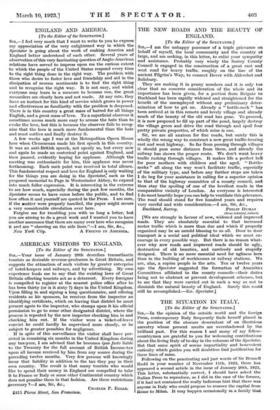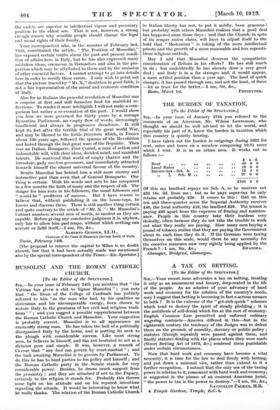THE SITUATION IN ITALY.
[To the Editor of the SPECTATOR.] Sna,—In the opinion of the outside world and the foreign Press, contemporary Italy frequently finds herself placed in the position of the obscure descendant of an illustrious ancestry whose present merits are overshadowed by the brilliant past. For this reason I and many of my fellow- countrymen are grateful to you for welcoming contributions about the living Italy of to-day in the columns of the Spectator. But that same spirit of serene impartiality and benevolent curiosity which guides you will doubtless find justification for these lines of mine.
Following on the penetrating and just words of Sir Rennell Rodd in your number of November 11th, 1922, there has appeared a second article in the issue of January 20th, 1923. This latter, substantially correct, I should have asked the Italian Press to reproduce, as I did in the case of the former, if it had not contained the really ludicrous hint that there was anyone in Italy who could propose to remove the capital from Rome to Milan. It may happen occasionally in a family that the cadets arc superior in intellectual vigour and pecuniary position to the eldest son. That is not, however, a strong enough reason why sensible people should change the legal and moral rights of their family.
Your correspondent who, in the number of February 3rd, 1923, contributed the article, "The Position of Mussolini," has exposed certain truths about the past and present condi- tion of affairs here in Italy, but he has also expressed many mistaken ideas, erroneous in themselves and also in the pro- portion which may be attributed to them and by the omission of other essential factors. I cannot attempt to go into details here in order to rectify these errors. I only wish to point out that the picture traced by "Mr. X," doubtless in good faith, is not a fair representation of the moral and economic condition of Italy.
Also for us Italians the peaceful revolution of Mussolini was a surprise at first and still furnishes food for multifold re- flections. To render it more intelligible I will not make a com- parison but rather a re-evocation of the past. I would show you how we were governed for thirty years by a corrupt Byzantine Parliament, an empty flow of words, increasingly insufficient and always in progressive decadence. It still kept its feet after the terrible trial of the great world War, and may be likened to the feeble Directoire which, in France about 130 years ago, followed the spasms of the Revolution and lasted through the first great wars of the Republic. Then rose an Italian, Bonaparte, First Consul, a man of action and indomitable will, with clear ideas, decided mind, and manifold talents. He scattered that world of empty chatter and the irresolute, gaily careless governors, and immediately attracted towards himself the almost universal favour of the country.
Benito Mussolini has behind him a still more stormy and instructive past than even that of General Bonaparte. One thing is certain. With his words and acts he has conquered in a few months the faith of many and the respect of all. The danger for him rests in his followers, the usual followers and " would-be " profiteers of success. But I have reason to believe that, without publishing it on the house-tops, he knows and discerns them. There is still another thing certain and quite contrary to the article of "Mr. X. " : Mr. Mussolini's Cabinet numbers several men of worth, as modest as they are capable. Before giving any conclusive judgment it is, anyhow, only fair to allow him qtsel tempo, without which nothing can mature or fulfil itself.—! am, Sir, &e.,
ALBERTO GEISSER, LL.D., Chairman of the Cana di Rlaparmio (Savings Bank) of Turin.
Turin, February 12th. .
[The proposal to remove the capital to Milan is no doubt absurd, but that it had been actually made was mentioned also by the special correspondent of the Times.—ED. Spectator.]











































 Previous page
Previous page